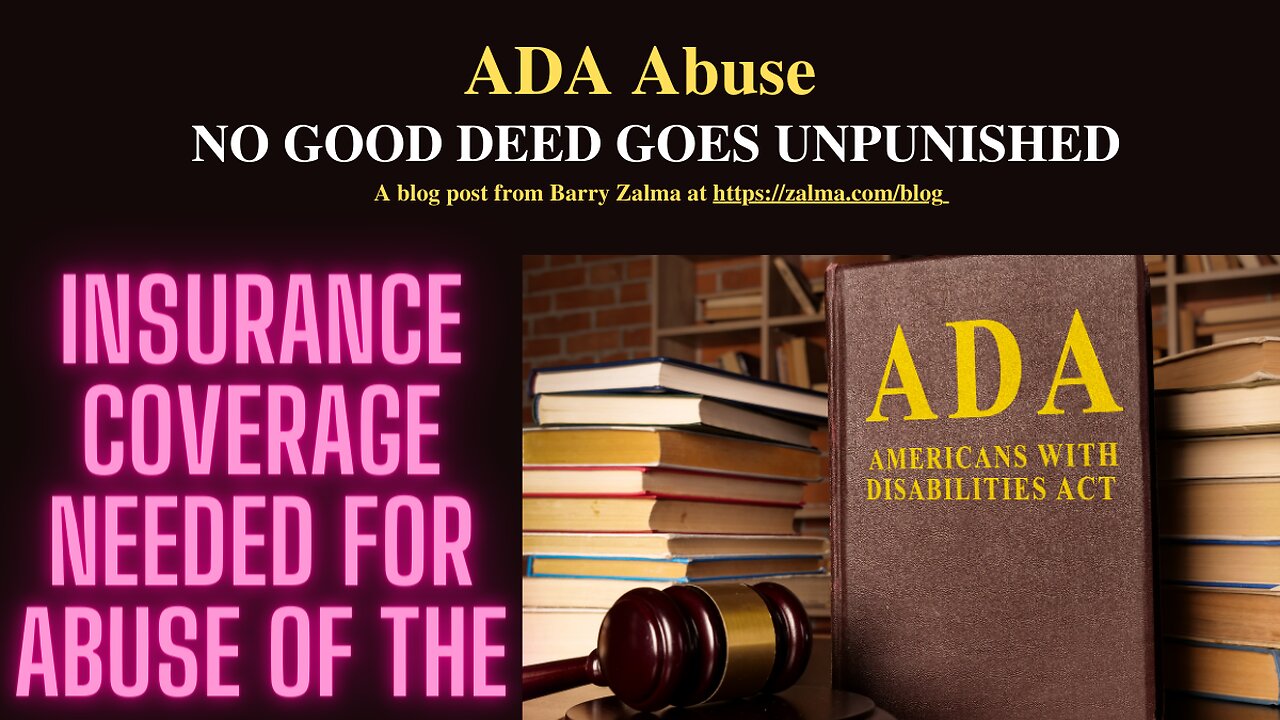Premium Only Content

No Good Deed Goes Unpunished
Why A New Market for Insurers to Protect Small Businesses is Needed
The Americans with Disabilities Act (ADA) was signed into law by President George H. W. Bush on July 26, 1990 with the good intentions of helping people with disabilities. It is a federal civil rights law that prohibits discrimination against people with disabilities in everyday activities. The ADA guarantees that people with disabilities have the same opportunities as everyone else to enjoy employment opportunities, purchase goods and services, and participate in state and local government programs.
The stated goal of the ADA was to eliminate discrimination against individuals with disabilities. A major source of discrimination suffered by disabled individuals is the inability to gain access to public accommodations such as restaurants, hotels, movie theaters, gas stations and the facilities of other small businesses.
The intent of the statute was to ascertain that businesses that want to comply with the law should be able to do so without undue cost, delay, or uncertainty. Although the statute was full of good intentions the law of unintended consequences took hold and those good intentions, were taken advantage of by unscrupulous people and their lawyers. Lawsuits proliferated by persons who claimed to be disabled or simply took the position that they were advocates for the disabled.
In truth, the ADA advocates and their lawyers litigated under the ADA with the sole purpose of making money. Most had no intention or concern about the needs of those with disabilities. They took advantage of the provisions of the statute that allow individuals to enforce the accessibility requirements to bring a private right of action against individual businesses and property owners.
This important reform in advancing equal access for the disabled has been used by some bad actors for monetary gain more than disability advocacy and threatens the small business economy in some states. The people abused by these bad actors are the owners of small businesses and owners and tenants of small retail establishments like the owners of bodegas, liquor stores, chiropractors, health care providers, and lessors.
Under the private right of action allowed by the ADA an aggrieved party can seek injunctive relief remedying the violation and attorney's fees and costs. Monetary damages are not available to private parties seeking to enforce the requirements of the ADA.
By providing differing remedies for private and public enforcement revealed to abusers a method to profit from the underlying intent of Congress to prevent private plaintiffs from recovering monetary relief under the ADA. Although the ADA sets its intent clearly, Small business owners have found they are added to the growing evidence of abuse of the private remedies provided by the ADA where, as a small business and small property owner, he or she either must litigate with the ADA advocates or succumb to the abusive lawsuit with a settlement. If they contact a lawyer, they will be advised that they will lose the litigation if there is even small technical errors of compliance and be required to pay fines and attorney’s fees to the advocates and their lawyers. The litigants and their lawyers know this and will offer to settle for a sum close to reasonable so that they can negotiate down to a reasonable amount.
The complaints, and discovery are all computer generated by the advocate’s lawyers with only the names of the plaintiff, defendants and non-compliant part of the property, changed. The litigation expense for the plaintiff and counsel is minimal and for the defendant it is excessive. Small business people don’t have the funds necessary to protect themselves from an action legally filed under the ADA and concurrently pay to bring the property into compliance. Agreeing to an offer of settlement is the only choice available to a small business owner because no liability policy provides coverage for the defense or indemnity of the suit brought under the ADA.
In a case with which I am familiar a law firm specializing in filing ADA lawsuits, and nothing else, sued a small business owner allegedly on behalf of a person claiming disabilities who met with the receptionist and made an appointment to which she never appeared. Shortly after her scheduled appointment the plaintiff filed and served an ADA lawsuit claiming that the doorbell to the business was mounted about 60 inches above the ground rather than the 40 inches required for the use of a person in a wheelchair, a technical violation of the ADA.
In the 30 years since the building was acquired by its owner and leased by its tenant there were no complaints of the inability to use the doorbell. Regardless, the suit was filed and served, and defense counsel was required to be retained to avoid default at the expense of the owner and the tenant from their limited private funds.
The abuse of the ADA started with its enactment. The abuse of the ADA is well known to Federal District Court and state judges, who see the same plaintiffs over and over again. There is nothing the judges can do, because of the clear language of the ADA statutes, require that the judge fulfill the requirements of the statute.
Attempts have been made to curb the abuse. For example, in 2006, the Hastings Womens Law Journal, 17 Hastings Women's L.J. 93 2006 published an article entitled Private Enforcement of the Americans with Disabilities Act via Serial Litigation: Abusive or Commendable? by Carri Becker, then a JD candidate. The cases Ms. Becker described were identical to the suit I became aware of and whose defendant found itself to be one of a multitude of ADA lawsuits filed across the country and that the minor abuses claimed would cost thousands of dollars to cure plus the fees of the lawyers who brought the suit and the fees of counsel retained to defend the small business owner.
Since 2006 ADA lawsuit abuse continued to be prolific throughout the nation. Profitability of ADA litigation has given rise to what courts have described as "a cottage industry" that has little or nothing to do with assisting people with disabilities. Ms. Becker noted that, for example, “a single law firm in Philadelphia has filed hundreds of lawsuits on behalf of two disabled men, reaping thousands in attorney's fees.”
Adding to the burden, small businesses are forced to comply not only with the federal standards outlined in the ADA, but also with any state, county, or city-specific regulations. With so many different regulations to follow, it is not surprising that many, if not most, buildings constructed before 1990 are out of compliance. Compounding the problem is the fact that the regulations differ substantially.
For example, California's Title 24 regulations require that curb ramps have a one-half inch lip at the bottom, beveled at a 45-degree angle, whereas the ADA requires a flush transition at the bottom of the ramp. Total compliance with both state and federal regulations becomes impossible. It becomes obvious that the intent of almost all the parties filing suits on behalf of people with disabilities are really designed to bring about a cash settlement. For example, although the property owner cured the deficiency with the placement of a new $5 doorbell the demand to settle the lawsuit before discovery and adding lawyers fees was $15,000. In addition, a check of court records indicated that the plaintiff who sued the small business had filed multiple ADA lawsuits.
One explanation for many people's distaste for the enforcement of the ADA via serial litigation is that the plaintiffs and their attorneys stand to financially gain from each of the suits they file and often fail to make the property ADA compliant.
EXAMPLES OF ADA LAW SUITS
Common examples of ADA lawsuits may include when individuals visit several business establishments within the intent to identify ADA violations, which may include the lack of handicapped parking spaces or the lack of wheelchair ramps, and then suing that business for the violation although the plaintiff was not injured. In certain instances, the individual may drive by the establishment and search for violations in the parking lot or outside of the business and never actually enter the establishment or attempt to conduct any business there. These individuals can target several businesses at once, often with the intent to win a large sum of money from the business for their claimed lack of compliance.
As the Los Angeles Times reported in November 2018, about 10,000 ADA lawsuits were filed in the first six months of that year. Businesses are able to handle the cost of the upgrades to ensure access. The lawyers that file the ADA lawsuits demand huge payouts. The law lets them do so without first giving the business owner a chance to fix the lack of availability of a compliant property.
For example, according to the Orange County Register one Orange County firm filed 335 ADA cases in the past year, including three dozen for a visually impaired Montana woman. The Register concluded that: “This isn’t about access — it’s simple extortion.” [https://www.ocregister.com/2018/11/20/the-latest-abuse-of-the-americans-with-disabilities-act/] What the Register did not report was that the “extortion” is perfectly legal as a result of the ADA statute.
In some cases, the lawsuits are collected from the comfort of the attorney’s car or even couch, driving by handicapped parking spots to assess violations or using Google Earth to find motels without accessible pool lifts for the disabled.
Lawsuits aiming to bring about compliance with an important equal rights law like the ADA are important in advancing the cause. Some of the serial litigators are doing more to rake in damages than increase accessibility. As many states have statutes that go beyond the federal bill and offer individual lawsuit filers cash payments as well as attorney expenses, the incentives to file a lawsuit shift from accessibility to cash recovery.
THE COSTS IMPOSED
In California, in addition to having both sides’ legal fees covered by the defendant, a plaintiff may recover a fine of a minimum of $4,000 per ADA violation and the plaintiff is not required to offer a grace period for the violation to be rectified.
ADA regulations are poorly dealt with by the nearly 30 million small businesses in the US. Small businesses often lack the expertise, capital and legal support to understand and adhere to the regulations. If a business owner’s first notice of non-compliance with the law is a lawsuit the system is askew, and the small businessperson is not equipped nor able to fund defense of the suit.
Sadly, a few attorneys – the ADA “trolls” — realized that ADA can be a profit center by simply filing cases that, on the surface, have merit. But instead of pursuing those cases to a conclusion, the “trolls” offer to go away in exchange for a financial payoff. The “trolls” are especially active in California and New York, where state laws permit private individuals to recover money damages. For years, most of the ADA “troll” cases involved people in wheelchairs suing over physical or architectural accessibility. Suits would be filed, and the attorneys would then demand a certain amount of money to simply go away. These are not “frivolous” suits in the sense that they have no merit. What sets these lawsuits apart is that they are filed with such enormous volume that the attorneys involved could not possibly represent the plaintiffs properly in any one of them.
The critical element of the “troll” lawyers’ business plan is volume. The attorneys have to file a lot of cases. And they do. One “pioneer” in this area was a wheelchair-bound California plaintiff whose attorney filed some 400 lawsuits claiming that he confronted virtually identical barriers to access at different businesses, mostly restaurants. These became referred to as “drive-by” cases because there was little or no proof that the named plaintiff had ever actually visited the businesses in question. Although only one of those cases ever actually went to trial, his attorney made an estimated $10 million, and it was not clear how many of the businesses actually fixed the supposed problem.
A website, adaabuse.com, reports Mega-ADA-suit-filers one of whom was so egregious he was disbarred. Although there have been attempts to modify the ADA to avoid these abuses the statute remains unchanged.
LIABILITY INSURANCE UNAVAILABLE
Since no insurance policy provides coverage for an ADA suit because there is no claim of bodily injury, property damage or personal injury. Liability insurance, like that provided by a Commercial General Liability (CGL) policy or a Business Owners Policy (BOP) will never provide a defense or indemnity to an insured for lack of covered claimed injuries.
Since an ADA suit neither makes a claim for property damage or bodily injury but only seeks an injunction requiring compliance and attorney’s fees there is no coverage under a Commercial General Liability policy or a Business Owners Policy leaving the small business owner to defend and negotiate a settlement with the troll.
A PROPOSAL FOR THE INSURANCE INDUSTRY
It seems to me that ADA will not be changed to protect against ADA abuse. Every small business in a facility built before 1990 or without concern for ADA requirements, like most, is a potential defendant in an ADA suit and will be held to uninsured ransom.
No current liability insurance policy, CGL, BOP, or common liability insurance policy provides coverage for the ADA suit. As a result, a small business owner, lessor or lessee that protects with insurance will find their assets naked to the ADA trolls. The small business owner will need to retain counsel, defend the suit, pay the legal extortion or face a major judgment.
The ADA has created a large market for the liability insurance industry who, by use of a simple endorsement to a CGL or BOP, can create coverage to protect the small business owner and work to defeat the ADA trolls ability to profit from the scheme.
PROPOSED ENDORSEMENT
The Endorsement wording, I propose follows:
THIS ENDORSEMENT CHANGES THE POLICY. PLEASE READ IT CAREFULLY
It is hereby understood and agreed that the policy is revised to read as follows from the date of inception to the date of expiration stated in the Declarations:
Americans With Disabilities Act Endorsement
Special Limits of Liability Applying to this endorsement:
$25,000 for the cost to make your property comply with the requirements of the ADA to conform to the accessibility required by the ADA and alleged to be in violation of the ADA by a civil suit naming you as a defendant.
Insuring Agreement:
We agree to pay whatever is required by counsel of our choice to defend and indemnify you if you are sued for violation of the Americans With Disabilities Act (ADA) that are claimed to have prevented a person with a disability or disabilities that the plaintiff or plaintiffs claim prevented the plaintiff(s), and/or others similarly situated, to access and use your premises because they were not in compliance with ADA standards as it relates to users with disabilities like the person suing as plaintiff.
We also agree to indemnify you of the cost to bring your property in compliance with the ADA and correct the errors or deficiencies alleged in the suit brought against you, up to the limits of liability.
All other terms and conditions remain the same.
Every owner of a small commercial building, apartment house, rental property, or operating a small business that invites the public should or will rush to buy insurance to protect against the risk. The prudent insurer, with a staff of lawyers, adjusters, and contractors will rush to issue an endorsement that, for a reasonable additional premium, will find thousands of small business, small property owners, and everyone who is open to the public, eager to pay extra to add the coverage to their liability insurance policies.
(c) 2023 Barry Zalma & ClaimSchool, Inc.
Subscribe and receive videos limited to subscribers of Excellence in Claims Handling at locals.com https://zalmaoninsurance.locals.com/subscribe.
Consider subscribing to my publications at substack at https://barryzalma.substack.com/publish/post/107007808
Barry Zalma, Esq., CFE, now limits his practice to service as an insurance consultant specializing in insurance coverage, insurance claims handling, insurance bad faith and insurance fraud almost equally for insurers and policyholders. He practiced law in California for more than 44 years as an insurance coverage and claims handling lawyer and more than 54 years in the insurance business. He is available at http://www.zalma.com and zalma@zalma.com
Follow me on LinkedIn: www.linkedin.com/comm/mynetwork/discovery-see-all?usecase=PEOPLE_FOLLOWS&followMember=barry-zalma-esq-cfe-a6b5257
Write to Mr. Zalma at zalma@zalma.com; http://www.zalma.com; http://zalma.com/blog; daily articles are published at https://zalma.substack.com. Go to the podcast Zalma On Insurance at https://podcasters.spotify.com/pod/show/barry-zalma/support; Follow Mr. Zalma on Twitter at https://twitter.com/bzalma; Go to Barry Zalma videos at Rumble.com at https://rumble.com/c/c-262921; Go to Barry Zalma on YouTube- https://www.youtube.com/channel/UCysiZklEtxZsSF9DfC0Expg; https://creators.newsbreak.com/home/content/post; Go to the Insurance Claims Library – https://zalma.com/blog/insurance-claims-library.
-
 8:57
8:57
Barry Zalma, Inc. on Insurance Law
1 year agoNo Coverage for Benefits no Right to Bad Faith Damages
201 -
 1:26:01
1:26:01
Roseanne Barr
16 hours ago $27.85 earnedAbsolutely Fabulous W/ Shannon Hughey #94
114K27 -
 8:00:05
8:00:05
SpartakusLIVE
14 hours agoDuos w/ Nicky || Friday Night HYPE
15.1K -
 2:06:42
2:06:42
TimcastIRL
13 hours agoPolice ARREST "MR SATAN" For Threatening To ASSASSINATE Trump, KILL ICE Agents | Timcast IRL
254K276 -
 8:12:48
8:12:48
XxXAztecwarrior
12 hours agoKilling Little Timmy's On Verdansk
78.8K3 -
 4:53:16
4:53:16
SynthTrax & DJ Cheezus Livestreams
1 day agoFriday Night Synthwave 80s 90s Electronica and more DJ MIX Livestream THE NEW MODEL - Variety Edition
70.2K10 -
 LIVE
LIVE
Anthony Rogers
1 day agoAnthony Rogers Show - 24/7 Stream
282 watching -
 2:11:55
2:11:55
Total Horse Channel
21 hours ago2025 CMSA Extravaganza | Mounted Shooting
68.4K3 -
 4:50:33
4:50:33
VapinGamers
12 hours ago $5.61 earnedGedonia 2 - Early Release Preview and Co-Stream! - !game #Sponsored
76.5K -
 1:32:39
1:32:39
Glenn Greenwald
17 hours agoWeek in Review: Trump's Tariffs, Ukraine Negotiations, Possibility of War with Iran, and More with Glenn Greenwald, Lee Fang, & Michael Tracey | SYSTEM UPDATE #438
157K76